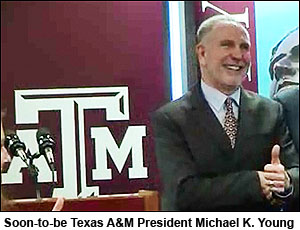OPINION
Texas, Big Oil put higher ed money where their mouths are
By BILL LYNE
(Feb. 24, 2015) — So University of Washington President Michael K. Young has gone the way of Mark Emmert, leaving our fair state to chase every college president’s dream of someday getting paid like an assistant football coach.
 Much speculation has ensued as to why anyone would leave a badass research institution in cosmopolitan Seattle for a land grant agricultural and mechanical school in the heart of Brazos County that even most Texans make fun of. Tempting as it may be to join in the unseemly discussions of President Young’s personal life or tell the sad story of how college presidents have become peripatetic CEOs, at the United Faculty of Washington State blog, we think that this might be one of those rare instances when we should pay attention to what the guy actually said.
Much speculation has ensued as to why anyone would leave a badass research institution in cosmopolitan Seattle for a land grant agricultural and mechanical school in the heart of Brazos County that even most Texans make fun of. Tempting as it may be to join in the unseemly discussions of President Young’s personal life or tell the sad story of how college presidents have become peripatetic CEOs, at the United Faculty of Washington State blog, we think that this might be one of those rare instances when we should pay attention to what the guy actually said.
He said he’s leaving a state where they don’t invest in higher education for one where they do. He said it a little more politely, but that’s what he meant.
And while the cynical among us may still have their doubts, no one can argue that what he said was wrong. Washington ranks 49th in the nation in total higher education spending per student. Texas invests over a thousand dollars more per student in higher education than Washington does. Texas is $682 above the national average in total per student funding, while Washington is $2,800 below.
So if President Young was looking for a place where politicians actually put their money where their mouth is on higher education, he made the right move.
Meanwhile, back at the ranch, state Sens. Barbara Bailey (R-Oak Harbor) and John Braun (R-Centralia) held a press conference to announce that they were introducing a bill that would cut tuition at our state universities by about 30 percent. The impulse to reduce the tuition burden that years of cuts to state funding have put on our students is a good one. And the impulse seemed even better when Senators Braun and Bailey promised that their proposal would fill the gaping hole in university budgets that a tuition decrease would leave and “hold the universities harmless.”
This sounds great on TVW, but in real life it shows either a deep misunderstanding or a startling disregard for the harm that has already been done to Washington’s public universities. The Bailey/Braun bill would provide just enough funding to bring state universities back to the 2013-15 funding level. This is the level that ranks 49th in the country. The Bailey/Braun proposal doesn’t call for a dime of reinvestment in our universities. It assumes that continuing to have universities that suck fumes for funding will be fine as long as we reduce tuition. And it makes no mention of the reduced access, fewer programs, and longer time to graduation that our students will get for their reduced tuition.
And that is at least part of what drove Mike Young to east Texas — an ambition to do more than just barely keep public universities’ noses above water. Big Oil in Texas puts its money where its mouth is for higher ed in a way that aerospace and high tech in Washington have not.
Washington state politicians may not have figured out how to fund higher ed to Texas levels, but they do know a good campaign issue when they see one. Everybody in Olympia these days is claiming credit for the last tuition freeze. Senators are calling press conferences to trumpet tuition and everybody who has an eye on running for governor in 2016 regularly talks about tuition.
 And while the promise of tuition freezes and cuts may be good for votes it won’t be good for students unless these tuition talkers invest the money needed to support our state universities.
And while the promise of tuition freezes and cuts may be good for votes it won’t be good for students unless these tuition talkers invest the money needed to support our state universities.
Bill Lyne is an English professor at Western Washington University and the president of the United Faculty of Washington State. This column originally appeared at the UFWS blog and is crossposted here with the author’s permission.





